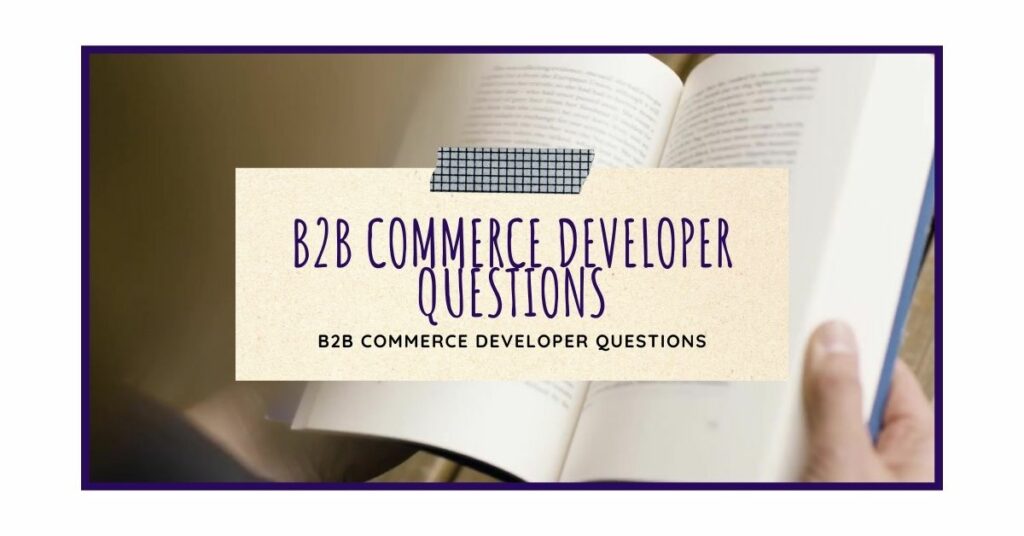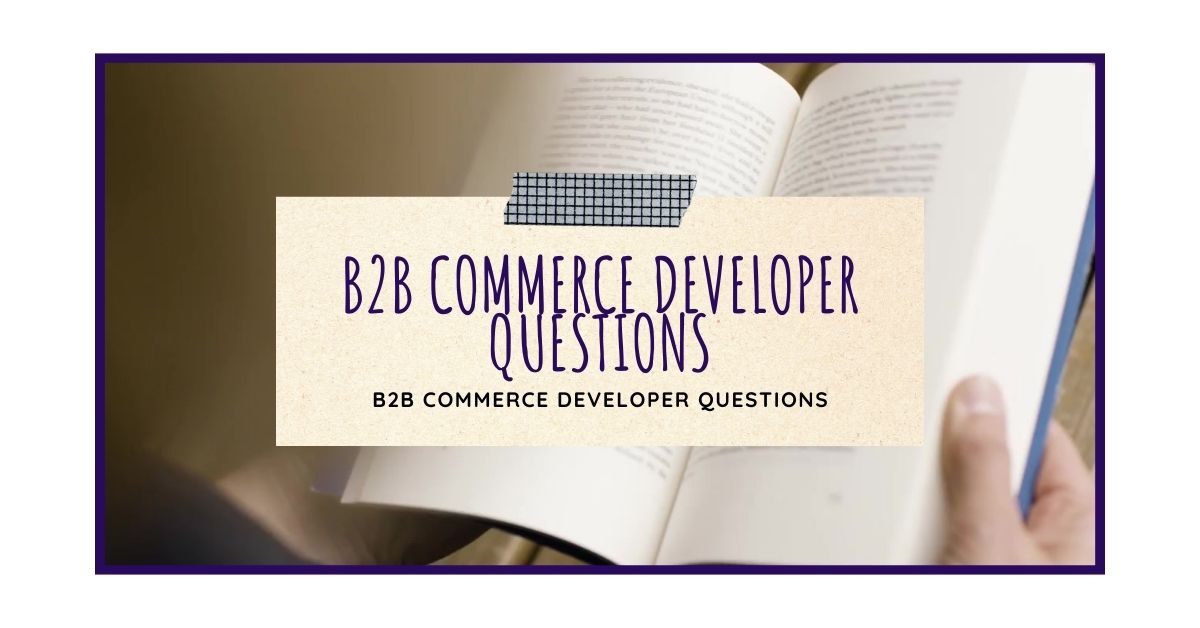Define your project’s specific B2B Commerce Developer Questions needs and objectives
Defining your project’s specific B2B Commerce Developer Questions needs and objectives is a crucial step in the development and successful execution of your strategy. Initially, it is essential to conduct a thorough analysis of your market, understanding the unique demands and preferences of your business clients. This involves identifying the specific products or services that meet their needs, as well as the most efficient and effective ways to deliver these solutions. Additionally, setting clear, measurable objectives is vital for tracking progress and ensuring that your B2B commerce initiatives align with your overall business goals.
Consideration should also be given to the B2B Commerce Developer Questions technological infrastructure required to support your B2B commerce activities. This includes selecting the right e-commerce platform that can handle the complexity of B2B transactions, including bulk orders, custom pricing, and extended payment terms. Moreover, integrating advanced analytics can help in understanding customer behaviour and preferences, enabling personalised and targeted marketing strategies. Ultimately, your project’s specific B2B commerce needs and objectives should focus on creating a seamless, efficient, and customer-centric experience that fosters long-term business relationships and drives growth.
Identify essential technical skills for a B2B Commerce Developer Questions
Identifying the essential technical skills for a B2B Commerce Developer Questions developer is paramount in today’s digitally driven market. Foremost among these skills is proficiency in programming languages such as Java, Python, and PHP, which are foundational to developing robust e-commerce platforms. Equally important is a deep understanding of database management systems, including SQL and NoSQL, to effectively store and manage vast amounts of data that B2B transactions generate.
Additionally, a B2B commerce developer must be B2B Commerce Developer Questions well-versed in the use of APIs for integrating various software applications and platforms, enhancing the functionality and user experience of the B2B commerce system. Knowledge of web development standards and protocols, including HTML, CSS, and JavaScript, is also crucial for creating responsive and user-friendly interfaces. Furthermore, experience with e-commerce platforms such as Magento, Shopify Plus, and WooCommerce, which offer specific features tailored to B2B commerce, can be a significant advantage.
Lastly, understanding cybersecurity principles and B2B Commerce Developer Questions practices is essential to protect sensitive business data and maintain trust with clients. Mastery of these technical skills enables a B2B commerce developer to build efficient, secure, and scalable solutions that meet the complex needs of business clients in the digital age.
Consider the developer’s experience with similar B2B projects
Considering a developer’s experience with similar B2B Commerce Developer Questions is critical when planning and executing a B2B commerce strategy. Such experience not only demonstrates a developer’s capability to navigate the complexities inherent in B2B transactions but also provides insight into their ability to innovate and customise solutions to meet specific business needs. A developer with a history of successful B2B projects is likely to have encountered and overcome common challenges, such as integrating with legacy systems, managing large-scale product catalogues, and implementing custom pricing models.
Moreover, their familiarity with the nuances of B2B Commerce Developer Questions , including the importance of building robust, secure platforms that facilitate seamless transactions and protect sensitive data, can significantly reduce project risks. Experienced developers will also have a keen understanding of the need for scalable solutions that can grow with your business, avoiding the need for costly overhauls as your requirements evolve. Evaluating a developer’s past projects and the results achieved for other B2B clients can provide valuable insights into their problem-solving abilities, technical expertise, and potential to deliver a solution that aligns with your business objectives.

Assess understanding of your industry’s B2B commerce challenges
Assessing a developer’s understanding of your industry’s specific B2B Commerce Developer Questions challenges is a pivotal step in ensuring the success of your digital initiatives. Each industry comes with its unique set of obstacles, from regulatory compliance and security concerns to specialised supply chain logistics and customer relationship management. A developer with a deep comprehension of these challenges can tailor solutions that not only meet but exceed the requirements of a particular sector.
For instance, in industries such as pharmaceuticals or B2B Commerce Developer Questions aerospace, where regulatory compliance is stringent, a developer’s knowledge of relevant laws and standards is crucial. This ensures that the commerce platform not only facilitates efficient transactions but also adheres to industry-specific regulations. Similarly, in sectors like manufacturing or wholesale, where supply chain complexity is a major concern, a developer’s ability to implement advanced inventory management and logistics tracking systems can significantly enhance operational efficiency. By assessing a developer’s understanding of these industry-specific challenges, businesses can select a partner who is not just technically proficient but also strategically aligned with their sector’s needs, paving the way for a B2B commerce solution that is both effective and compliant.
Evaluate the developer’s approach to security and data protection
Evaluating a developer’s approach to security and B2B Commerce Developer Questions data protection is imperative in the digital age, particularly for B2B commerce platforms where sensitive business and customer data are constantly exchanged. A developer’s commitment to implementing robust security measures and their knowledge of data protection laws are crucial factors that can significantly influence the integrity and reliability of your B2B commerce solution. It is essential that the developer not only adheres to industry-standard security practices but also stays abreast of the latest developments in cybersecurity to safeguard against emerging threats.
An adept developer will prioritise encryption of data both in transit and at rest, implement secure authentication and authorisation processes, and ensure regular security audits and vulnerability assessments are conducted. Additionally, their approach should include a comprehensive understanding of global data protection regulations such as the General Data Protection Regulation (GDPR) in Europe, demonstrating a commitment to maintaining the confidentiality, integrity, and B2B Commerce Developer Questions availability of data. By thoroughly evaluating a developer’s approach to security and data protection, businesses can ensure that their B2B commerce platform is not only secure but also fosters trust among their clients, which is indispensable for long-term success.
Inquire about integration capabilities with existing systems
Inquiring about a developer’s capabilities to integrate with existing systems is a critical consideration for businesses looking to enhance or establish their B2B Commerce Developer Questions platforms. Seamless integration ensures that new digital solutions work harmoniously with legacy systems, thereby minimising disruption and maximising efficiency. The ability to integrate effectively can significantly impact the overall functionality and user experience of the B2B commerce solution, affecting everything from inventory management to customer relationship management (CRM) systems.
A proficient developer should demonstrate a comprehensive understanding of various integration techniques and technologies, such as APIs, middleware, and custom connectors. Their approach should be tailored to accommodate the specific architecture and B2B Commerce Developer Questions requirements of your existing systems, ensuring compatibility and smooth data flow between systems. Moreover, the developer’s experience with similar integration projects in your industry can offer insights into their ability to navigate potential challenges and leverage best practices. By thoroughly inquiring about a developer’s integration capabilities, businesses can ascertain their potential to deliver a cohesive, efficient B2B commerce ecosystem that aligns with their operational needs and strategic objectives.
Discuss the developer’s methodology for project management and communication
Discussing a developer’s methodology for project management and B2B Commerce Developer Questions communication is indispensable for the successful execution of a B2B commerce project. The methodology adopted by a developer not only shapes the project’s trajectory but also influences the quality of the outcome and the efficiency of the process. A structured, transparent approach to project management ensures that all stakeholders are aligned with the project’s objectives, timelines, and deliverables. It is essential for the developer to employ a recognised project management framework, such as Agile, Scrum, or Waterfall, which facilitates flexibility, regular updates, and iterative improvements based on feedback.
Equally important is the developer’s communication strategy. Regular, clear communication is vital to address issues promptly, make informed decisions, and maintain project momentum. The developer should establish a communication plan that outlines the frequency of updates, the channels of communication (e.g., email, project management tools, meetings), and the escalation process for addressing challenges. This ensures that all parties B2B Commerce Developer Questions remain informed and engaged throughout the project lifecycle. By discussing and understanding a developer’s methodology for project management and communication, businesses can foster a collaborative environment that promotes transparency, accountability, and ultimately, the success of the project.
Request and review references or case studies from past B2B projects
Requesting and reviewing references or case studies from past B2B projects is a critical step in assessing a developer’s suitability for your project. This process provides tangible evidence of the developer’s experience, expertise, and the outcomes they have achieved for other businesses. References and case studies offer insights into the developer’s ability to deliver projects on time, within budget, and to the client’s satisfaction. They also highlight the developer’s problem-solving capabilities, their approach to overcoming challenges, and their capacity to innovate and adapt to the unique needs of B2B commerce.
When reviewing these materials, pay close attention to projects that are similar in scope and complexity to your own. This will give you a clearer understanding of how the developer approaches projects that align with your specific requirements. Additionally, consider reaching out directly to the businesses mentioned in the case studies to discuss their experiences working with the developer. This can provide invaluable first-hand feedback on the developer’s communication, reliability, and overall performance. By thoroughly vetting references and case studies, you can make a more informed decision, ensuring that you choose a developer capable of delivering a successful B2B commerce solution.
